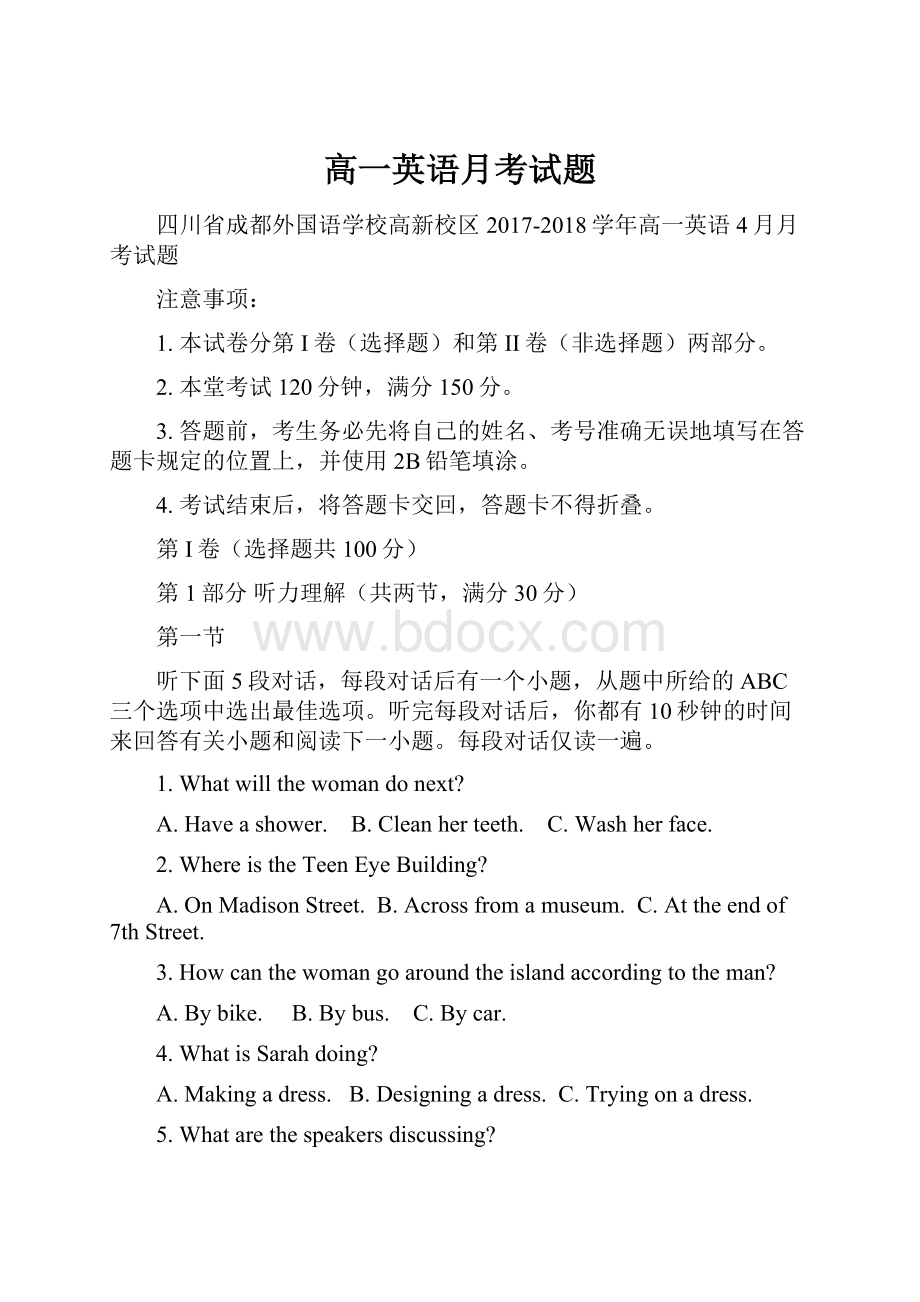高一英语月考试题.docx
《高一英语月考试题.docx》由会员分享,可在线阅读,更多相关《高一英语月考试题.docx(13页珍藏版)》请在冰豆网上搜索。

高一英语月考试题
四川省成都外国语学校高新校区2017-2018学年高一英语4月月考试题
注意事项:
1.本试卷分第I卷(选择题)和第II卷(非选择题)两部分。
2.本堂考试120分钟,满分150分。
3.答题前,考生务必先将自己的姓名、考号准确无误地填写在答题卡规定的位置上,并使用2B铅笔填涂。
4.考试结束后,将答题卡交回,答题卡不得折叠。
第I卷(选择题共100分)
第1部分听力理解(共两节,满分30分)
第一节
听下面5段对话,每段对话后有一个小题,从题中所给的ABC三个选项中选出最佳选项。
听完每段对话后,你都有10秒钟的时间来回答有关小题和阅读下一小题。
每段对话仅读一遍。
1.Whatwillthewomandonext?
A.Haveashower.B.Cleanherteeth.C.Washherface.
2.WhereistheTeenEyeBuilding?
A.OnMadisonStreet.B.Acrossfromamuseum.C.Attheendof7thStreet.
3.Howcanthewomangoaroundtheislandaccordingtotheman?
A.Bybike.B.Bybus.C.Bycar.
4.WhatisSarahdoing?
A.Makingadress.B.Designingadress.C.Tryingonadress.
5.Whatarethespeakersdiscussing?
A.WhenMaxisleaving.B.WhetherMaxlikesmusic.C.WhattheywillgetforMax.
第二节
听下面5段对话或独白,每段对话或独白后有几个小题,从题中所给的ABC三个选项中选出最佳选项。
听每段对话或独白前,你将有时间阅读各个小题,每小题5秒钟;听完后,各小题将给出5秒钟的作答时间。
每段对话或独白读两遍。
听第6段材料,回答第6,7题。
6.Whatarethespeakersdoing?
A.Theyarecooking.B.Theyarehavingapicnic.C.Theyarepreparingforatrip.
7.Whereistheknife?
A.Inthebluebag.B.Inthegreenbox.C.Intheyellowbox.
听第7段材料,回答第8,9题。
8.Whydoesthemancallthewoman?
A.Tobookaflight.B.Tocancelaflight.C.Toaskaboutaflight.
9.Howlongdoesthewholeflightlast?
听第8段材料,回答第10至12题。
A.Fourhours.B.Eighthours.C.Tenhours.
10.Whatistherelationshipbetweenthespeakers?
A.Husbandandwife.B.BossandsecretaryC.Co-workers.
11.WhatdoesthewomanwantDavetodo?
A.Attendameeting.B.Dealwithasalesreport.C.Tellherhisusername.
12.WhenwillthewomancallDave?
A.Thisafternoon.B.Tomorrowmorning.C.Tomorrowafternoon.
听第9段材料,回答第13至16题。
13.Whatactivitymaythemanchoose?
A.Thestreetperformance.B.Thefoodfestival.C.Theoutdoorconcert.
14.WhatwillbeperformedonSunday?
A.Jazz.B.Folkmusic.C.BeijingOpera.
15.Whatdoweknowaboutthefoodfestival?
A.Itisfreeofcharge.
B.Itwon’tprovidefoodforsale.
C.Ithasfoodfromdifferentplaces.
16.Whatdoesthemanhavetodoifhewantstoenjoythemusic?
A.Bookaseat.B.Gotothetheater.C.Payfortheticketearly.
听第10段材料,回答第17至20题。
17.Howdidtheaccidenthappen?
A.AtruckranintoKim’scar.
B.Kimwentthroughtheredlight.
C.Asportscarwasgoingtoofast.
18.Whatwastheresultoftheaccident?
A.Ashopassistantwashurt.
B.Kim’scarwasbroken.
C.Atruckwasdamaged.
19.Whatwastheyoungladydoingwhentheaccidenthappened?
A.WalkingalongBroadStreet.
B.Standingoutsideashop.
C.Drivinghercar.
20.Whotoldalietotheofficer?
A.Kim.B.Thetruckdriver.C.Thesportscardriver.
第2部分阅读理解(共两节,满分40分)
第一节(共15小题;每小题2分,满分30分)
阅读下列短文,从每题所给的四个选项(A、B、C和D)中,选出最佳选项。
并在答题卡上将该选项涂黑。
A
Poetryisneverfarawayfromourdailylives.Manyofusgrewuprecitingclassicpoemsfromtextbooks,learningtoappreciatethisbeautifulartformthat’sabletousejustafewlinestoconveysuchrichmeanings.Torecognizetheuniqueabilityofpoetrytocapturethecreativespiritofthehumanmind,WorldPoetryDayisheldbytheUnitedNationsonMarch21eachyear.Oneofthemaingoalsoftheday,accordingtotheUN,istosupportlinguistic(语言的)diversitythroughpoeticexpression.ChinesepoetryhasalonghistorythatdatesbacktotheWesternZhoudynasty.ItpeakedduringtheTangandSongdynasties.Eventoday,classicpoemsarestilllovedbyalotofpeople.AndevenTVseriesfeaturingclassicpoetryarehugelypopular.Forexample,inthe2011hitperioddrama,EmpressesinthePalace,alsoknownasTheLegendofZhenhuan,classicpoemsrecitedbytheshow’scharactersareoftenquotedbyinternetusers.Oneofthedrama’smostmovingsongswasadaptedfromaverse(韵文)writtenbyWenTingyunoftheTangdynasty.Onthesurface,theverse“displaysadailyscenario(场景)ofasolitary(独居的)woman;butunderneath,thepoetryexpressesthedejection(沮丧)ofanunderappreciatedandundervaluedscholar,”PengYuping,ascholaratSunYat-senUniversity,toldChinaRadioInternational.Meanwhile,theTVshowChinesePoetryCompetition,whichfeaturesclassicworksfromfamousChinesepoets,isalsoabigsuccess.“Inpoetry,I’vefoundechoesofhumanemotions,includinghappiness,anger,joyandsorrow,”oneoftheshow’scontestants,BaiRuyun,toldCCTV.“WhenIreadancienttexts,IfeelIreachthedepthsofthesepoemsandfindtherealmeaningsofthem.”AsanintellectualtestamenttotherichnessofChinesecivilization,classicpoetryhasbecomeanimportantwaytoinheritandspreadtraditionalChineseculture.InJanuary,theMinistryofEducationreleasednewcurriculumstandardsforhighschoolsthatrecommendstudentsrecite72ancientpoemsorarticles,upfrom14.Indeed,manypeoplebelievethatlearningclassicpoemsisimportantintoday’sworld.“Throughthebridgeofpoetry,peopletodaycanresonatewith(产生共鸣)theaestheticsandvaluesofourancestors.Theirwisdomhasgainednewlifeinthemodernworld,”YaoXishuang,directoroftheDepartmentofLanguageApplicationandAdministrationundertheMinistryofEducation,toldCCTV.21.WhydoestheUNholdWorldPoetryDay,accordingtothearticle?
A.Toencouragethecreationofpoetryaroundtheworld.B.Tobringattentiontothelinguisticdifferencesinpoetry.C.Tobuildabetterglobalcommunitythroughpoetry.D.Toremindpeopleofthelonghistoryofpoetry.22.Whatareparagraphs4-5mainlyabout?
A.Poetryinourdailylives.B.Poetryinmodernsociety.C.Poetryinahitrealityshow.D.Poetryinaperioddrama.23.Howmanymoreancientpoemsarehighsschoolstudentsrecommendedtomemorize,accordingtothenewcurriculumstandards?
A.14.B.21.C.58.D.72.
BIt’softensaidthattheriseofsocialmediahasrevolutionizedcommunication.Withsmartphonesandsocialnetworkingapps,wecanwritetoourfamilyandfriendswheneverwelike.Butwhilesocialmediahasbroughtusconvenience,italsohasitsproblems,suchasmisunderstandingsincommunication.Quiteoften,peoplemisinterpretwhat’swrittenonsocialmedia.AccordingtoastorypublishedonTheConversationonMarch8,sarcasm(讽刺),inparticular,canbeverydifficulttospotinawrittenmessage.Sarcasmisakindofirony(反语):
It’swhenwesaysomething,butreallymeantheopposite.Forexample,amessagefromafriendthedaybeforeamathexamthatsays“I’msolookingforwardtotomorrow!
”isobviouslysarcasm.Sarcasmbeforetheriseofsocialmediaandmobilephoneswasmostlyusedinspeechandfacetoface.Thatmadesarcasmeasier,becauseyoucouldaccompanyyourwordswithafacialgestureandatoneofvoicethatwouldhelpconveyyourmessage.Youhadagoodchanceofbeingunderstoodandreceivingalaughoranunderstandingglanceinresponse.Andyetwhenwetextorwritesomethingonline,alotofthatinformationgoesmissing.“Therearenofacialcues(暗示),novocaltonesandmaybeevenadelayedresponseifapersoncan’ttextyoubackimmediately,”wroteTheConversation.“Andifyoudon’tknowthepersonallthatwell,theregoesyourlastpotentialcue:
history.”Tohelpavoidmisunderstandings,peoplewhouseplatformssuchasTwitteroftenincludethehashtag#sarcasm–althoughthisislikehavingtoexplainajokewhenpeopledon’tlaughatit,whichdestroysthepointofsarcasminthefirstplace.Anditisn’tonlysarcasmthatcangetlostinelectroniccommunications.It’salsohardtospotsubtleemotionssuchasindifference.“Oneoftheproblemswithdigitalcommunication,whenitreliespurelyontext,isthatthissuckstheempathy(情感共鸣),theemotionalexpression,outofthecommunication.Soitcanleadtomiscommunication,”linguistVyvEvans,authorofTheEmojiCode,toldUSAToday.“Thisiswhereemojiscomeintotheirown.Theyputthebodylanguageback,sopeoplecanbetterreademotionalintent(目的).”However,eventhoughtherearehundredsofdifferentemojistochoosefrom,there’sstillnoreplacementforgoodold-fashionedface-to-facecommunication.24.Whatdoesapersonreallymeanwhentheysay,“I’msolookingforwardtotomorrow!
”,accordingtothearticle?
A.Theycan’twaittotaketheexam.B.Theyarewell-preparedfortheexam.C.They’renotlookingforwardtotakingtheexamatall.D.Theexammightbetoodifficultforthem.25.Whatmightleadtothewordswewriteonlinebeingmisunderstood,accordingtoTheConversation?
A.Theuseofnewinternetwordsandphrases.B.Thecomplicatedrelationshipbetweenpeople.C.Theabsenceoffacialexpressionsandtones.D.Respondingtootherpeopletooquickly.26.WhatdoesVyvEvansthinkisapossiblewaytoavoidmiscommunicationonline?
A.Usingemojis,astheycandisplaybodylanguage.B.Expressingfewerpersonalemotions.C.Sendingvoicemessagesinsteadoftextmessages.D.Usingahashtagbeforemakingjokes.27.Whatisthearticlemainlyabout?
A.Theconveniencesofonlinecommunication.B.Somemisunderstandingsthatcomewithdigitalcommunication.C.Agoodreplacementforface-to-facecommunication.D.Somereasonsforthepopularityofemojis.
CSinceEnglishbiologistCharlesDarwin(1809–1882)publishedOntheOriginofSpeciesin1859,scientistshavevastlyimprovedtheirknowledgeofnaturalhistory.However,alotofinformationisstillthesubjectofspeculation,andscientistscanstillonlymakeeducatedguessesatcertainthings.Onesubjectthattheyguessaboutiswhysome400millionyearsago,animalsintheseadevelopedlimbs(肢)thatallowedthemtomoveontoandliveonland.Recently,anideathatoccurredtotheUSpaleontologist(古生物学家)AlfredRomeracenturyagobecameahottopiconceagain.Seaanimalswouldhavebeenforcedintothesepoolsbystrongtides.The